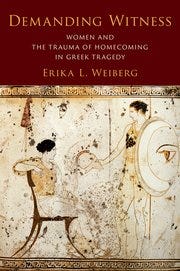Poetry rX: Wang Jiaxin's "At the Same Time"
for when you're wondering, (how) is it possible to feel hope and despair at the same time?
I’ve been creeping around our Modern Languages building fifth floor, pretending to be in a different department. Someone has posted, on their office door, a bumper-sticker-like adage: “It is possible to cure monolinguilism.”
I love that.
In honor of those who work to cure monolinguism everyday, I’d like to share this devastating poem with you by the Chinese poet Wang Jiaxin. Read “At the Same Time” now, up at Words Without Borders. It was translated by the immensely talented Arthur Sze. Thanks to my good luck of being connected to the UA Poetry Center, I had the pleasure of dining with Arthur Sze when I was extremely pregnant. I ate little and said nothing. I did feel, though. I felt his keen perception, his kindness, his willingness to listen. I’m sure these qualities are part of what makes him such an excellent translator (his poetic capacity, of course, is another).
Wang Jiaxin’s poem opens with a brutally stark depiction of the torture of a Burmese poet. Subsequent stanzas open with a variation on repetition, harkening back to the title— at the same time, an orchid blooms. At the same time, the speaker begins a google search, trying to learn more about another atrocity. What does it mean that these things are happening “At the same time,” that:
At the same time
I want to write a poem—
My thought-reaction: How many times have I learned of a tragedy— and there are so many to learn about, every day—and gone straight to the page, in an attempt to pin down my second-hand experience of violence, of atrocity that remains abstract to me? What’s the point of such pinning? Is it a second-hand trauma narrative, and if so, is it arguably inherently discardable? Is the rush to write a poem reflective of my own curiosity about my brain, my heart? What purpose does guilt serve on the page? Survivor’s guilt?
Books I’m adding to my #to-read pile:
Darkening Mirror, Wang Jiaxin, translated by Diana Shi & George O’Connell
In response to my thought-reaction, I’m going back to the library to request Erika Weiberg’s Demanding Witness: Women and the Trauma of Homecoming in Greek Tragedy. It will take me to a different part of the globe, and a different era of tragedy, but— I’ve been learning a bit about Weiberg’s thoughts on trauma narratives, and she goes to the (Western) root of that artistic practice.






You are a beautiful writer sweet Sara. 🥰